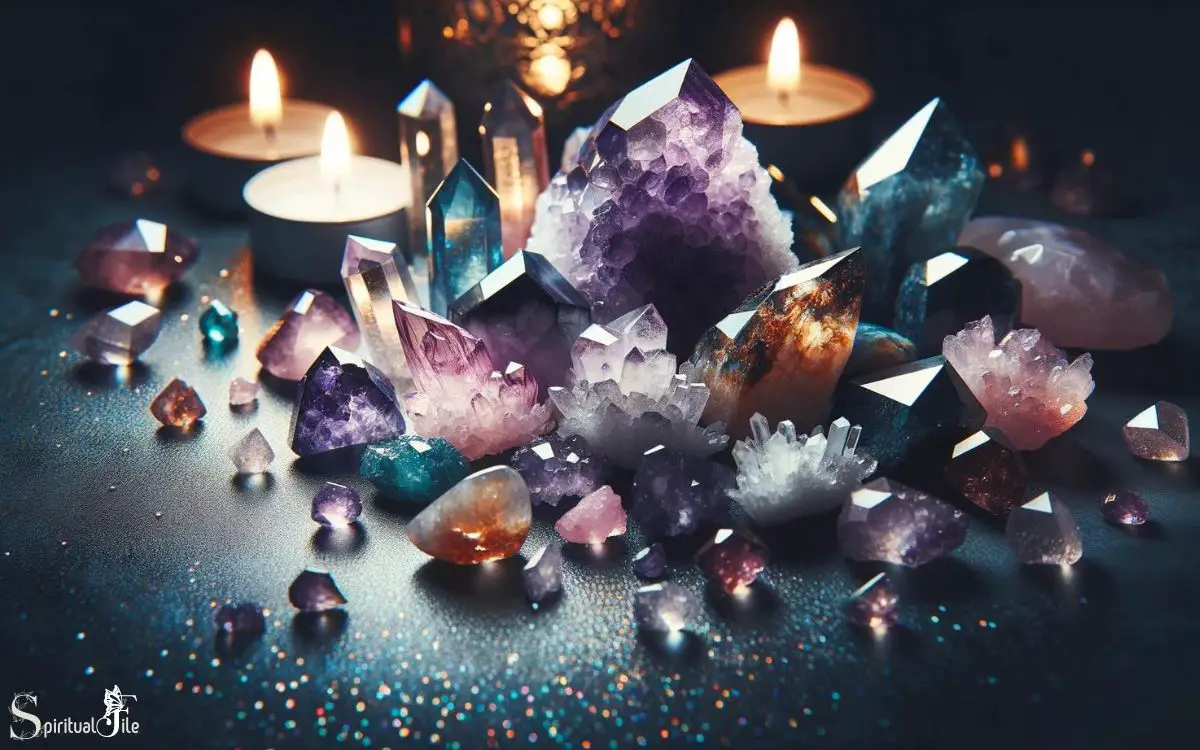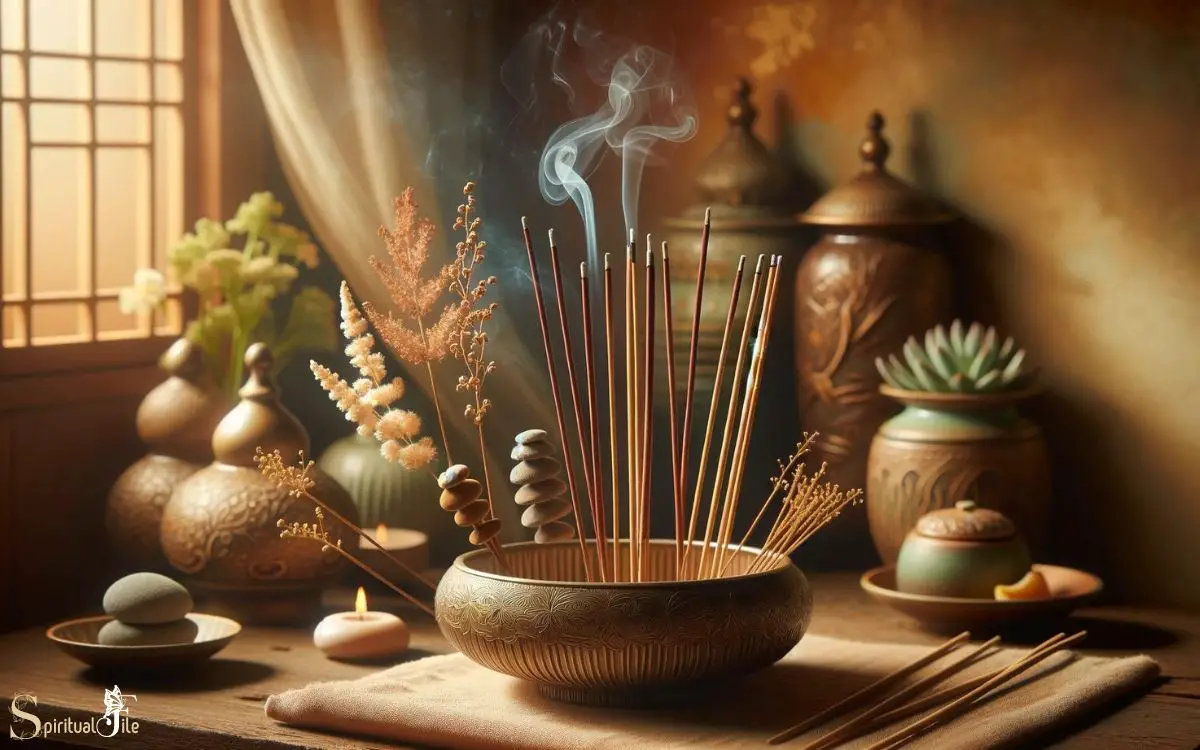Things Needed for Spiritual Bath: Energy!
To have a spiritual bath that rejuvenates your soul, you’ll need a bathtub or a space to bathe, essential oils like lavender or eucalyptus for their relaxing properties.
Epsom or Himalayan salt to purify and detoxify, herbs like rosemary or sage for their cleansing energies, crystals such as clear quartz or amethyst for healing, candles to create a serene ambiance, and soothing music or guided meditations to enhance the experience.
Ensure you set an intention for your bath to focus your energy on healing or releasing negativity.
A spiritual bath is a form of cleansing that is meant to wash away physical dirt and metaphysical impurities.
Unlike a regular bath that cleanses the body, a spiritual bath has the intention to cleanse the mind, spirit, and energy.
Here’s an example of how you might approach a spiritual bath:
Embrace the tranquility of a spiritual bath, an immersive ritual designed to purify the soul, balance energies, and soothe the mind in a serene sanctuary of self-care.

Key Takeaway
Herbs

When preparing for a spiritual bath, I always rely on the healing and cleansing properties of herbs, using them in combination with other elements to create a potent and restorative experience.
Herbs such as lavender, rosemary, and mint have been used for centuries to promote relaxation, healing, and purification. Lavender, for example, is known for its calming effects, making it perfect for soothing the mind and spirit during a spiritual bath.
Rosemary is often used for its purifying properties, helping to cleanse the aura and rid the body of negative energy.
Mint, on the other hand, is invigorating and refreshing, bringing a sense of renewal and vitality to the spiritual bathing experience.
These herbs, when used thoughtfully and with intention, can elevate the spiritual bath, making it a deeply healing and transformative practice.
Essential Oils
I love using essential oils for their aromatherapy benefits and relaxation properties. Blending different oils for specific purposes, such as purification and cleansing, can enhance the spiritual bath experience.
Understanding the uses and benefits of essential oils is essential for creating a personalized and effective spiritual bath ritual.

Aromatherapy Benefits and Uses
To enhance the spiritual bath experience, I rely on the benefits and uses of essential oils in aromatherapy. Essential oils have various therapeutic properties that can promote relaxation, uplift mood, and cleanse the spirit.
Here are some ways I use essential oils for aromatherapy in my spiritual bath:
- Lavender: Known for its calming and soothing properties, I add a few drops of lavender essential oil to my bathwater to relax my mind and body.
- Frankincense: This essential oil is perfect for grounding and spiritual connection. I use it to create a sacred atmosphere during my spiritual bath.
- Eucalyptus: When I need to clear my mind and invigorate my senses, I turn to eucalyptus essential oil to refresh my spirit during the bath.
Aromatherapy with essential oils truly enhances the overall experience of a spiritual bath, promoting a sense of well-being and inner peace.
Blending for Relaxation
For my spiritual bath, I rely on blending essential oils to create a serene and calming atmosphere. Lavender, chamomile, and ylang-ylang are my go-to essential oils for relaxation. Lavender’s soothing floral scent helps to ease tension and promote relaxation.
Chamomile has a gentle, comforting aroma that calms the mind and body, while ylang-ylang’s sweet and exotic fragrance is known for its ability to reduce stress and anxiety.
When blending these oils, I typically use a carrier oil like sweet almond or jojoba to dilute them and ensure safe application to the skin.
A few drops of each essential oil mixed together in the carrier oil can be added to the bathwater, creating a tranquil and peaceful bathing experience that promotes relaxation and a sense of well-being.
Purification and Cleansing
Blending essential oils for purification and cleansing, I focus on selecting oils known for their purifying properties and creating a cleansing and refreshing bath experience.
When crafting essential oil blends for spiritual baths, consider the following:
- Lavender Oil: Known for its calming and cleansing properties, lavender oil helps to purify the mind and spirit, promoting a sense of peace and relaxation.
- Tea Tree Oil: With its powerful antibacterial and antiviral properties, tea tree oil is excellent for cleansing and purifying the body, mind, and soul.
- Eucalyptus Oil: This oil is renowned for its refreshing and invigorating scent, making it a great choice for spiritual baths aimed at cleansing and purifying the senses.
These essential oils, when combined thoughtfully, create a rejuvenating and purifying experience, ideal for spiritual cleansing baths.
Candles

I light a white candle to create a peaceful and sacred atmosphere during my spiritual bath. The gentle flicker of the flame helps me focus and center my energy. White candles are often used for purification and protection, making them perfect for spiritual practices.
As I sit in the warm water, the soft glow of the candle brings a sense of calm and serenity to the space. It’s important to place the candle in a safe and stable location, away from any flammable materials.
The presence of the candle symbolizes the light within and reminds me to stay connected to my inner wisdom. It’s a simple yet powerful addition to my spiritual bath, enhancing the experience and allowing for deep introspection.
Crystals

During my spiritual bath, I place crystals around the tub to enhance the energy and promote healing. I believe in the power of crystals to amplify the intentions of my bath.
Here’s how I use them:
- Clear Quartz: This crystal is known for its ability to cleanse and amplify energy. I place it near the tub to purify the energy around me.
- Amethyst: Known for its calming properties, I use amethyst to bring a sense of peace and tranquility to my bath.
- Rose Quartz: As I soak, I surround myself with the gentle, loving energy of rose quartz, promoting self-love and emotional healing.
These crystals, combined with the warm water and intention of my bath, create a deeply rejuvenating and healing experience.
Incense

To enhance the ambiance of my spiritual bath, I use a few sticks of my favorite incense. The gentle fragrance helps to create a calming and peaceful atmosphere, allowing me to relax and focus during my spiritual practice.
I often choose incense with scents like lavender, sandalwood, or frankincense, as they are known for their soothing and grounding properties. As the incense burns, I take deep breaths, allowing the aroma to fill the space and clear my mind.
It’s important to select high-quality, natural incense to avoid artificial additives that can be overpowering or distracting.
The gentle curling smoke adds a sense of ritual to the experience, signaling the beginning of my sacred bath and providing a sensory cue for mindfulness and meditation.
Salt
I’ve always been fascinated by the role of salt in spiritual practices. It’s incredible how different types of spiritual salts are used for purification and cleansing rituals. The ritual and symbolism associated with salt in spiritual baths are truly intriguing.

Types of Spiritual Salts
I prefer using different types of spiritual salts, such as Epsom salt and sea salt, to purify and cleanse my spiritual energy. These salts have unique properties that can enhance the spiritual bathing experience.
Here are some types of spiritual salts that are commonly used:
- Epsom Salt: This salt is known for its ability to relieve muscle tension and promote relaxation. It can also help in removing negative energy and promoting spiritual healing.
- Sea Salt: Sea salt is believed to be a powerful purifier that can cleanse the aura and remove negative influences. It is often used in spiritual baths to promote clarity and emotional balance.
- Himalayan Pink Salt: This salt is valued for its purity and ability to balance the body’s energy. It is often used in spiritual baths to promote inner peace and spiritual growth.
Purification and Cleansing
When it comes to purification and cleansing, salts like Epsom salt and sea salt are indispensable for their ability to remove negative energy and promote spiritual healing.
Epsom salt, also known as magnesium sulfate, has been used for centuries to detoxify the body and clear away negative energy. Its high magnesium content helps to relax the muscles, calm the mind, and release any emotional tension.
Sea salt, on the other hand, is valued for its ability to absorb negative energy from the body and the environment. It is also rich in minerals that can help restore balance and vitality.
Both salts can be used in spiritual baths to cleanse the aura, release negativity, and promote a sense of well-being and renewal.
Ritual and Symbolism
One essential element for the ritual and symbolism of spiritual baths is the use of salt. Salt holds significant symbolism across various cultures and traditions, representing purification, protection, and grounding.
In the context of a spiritual bath, salt serves as a powerful tool for cleansing the aura, removing negative energy, and creating a sacred space for spiritual practice.
Here’s why salt is crucial for spiritual baths:
- Purification: Salt is believed to have purifying properties that can cleanse the body, mind, and spirit.
- Protection: It acts as a barrier against negative influences and can help in creating a shield of protection.
- Grounding: Salt aids in grounding and centering oneself, fostering a sense of stability and balance.
Flowers
For a spiritual bath, fresh flowers are essential for their cleansing and uplifting properties. Different flowers hold unique spiritual significance and can enhance the overall experience of the bath.

Here are some flowers commonly used in spiritual baths and their associated properties:
| Flower | Properties |
|---|---|
| Lavender | Calming, healing, and protection |
| Rose | Love, compassion, and emotional healing |
| Chamomile | Purification, relaxation, and inner peace |
These flowers can be used individually or combined to create a personalized blend that resonates with one’s intentions for the spiritual bath.
The presence of flowers in the bath water not only adds a delightful fragrance but also infuses the water with their unique energy, promoting a deeper sense of cleansing and renewal.
As we consider the importance of flowers, it’s equally crucial to explore the significance of using sacred water in spiritual baths.
Sacred Water
What properties make water sacred in spiritual baths, and how can it be obtained? Sacred water is believed to possess purifying and healing properties that can cleanse the body, mind, and spirit.
It is often obtained through specific rituals or collected from natural sources such as springs, rivers, or oceans.

To prepare sacred water for a spiritual bath, follow these steps:
- Gather: Collect water from a source that holds personal or spiritual significance.
- Bless: Perform a blessing or prayer over the water to imbue it with sacred energy.
- Charge: Place the water in direct sunlight or moonlight to charge it with positive energy before use.
Conclusion
After gathering all the necessary items for a spiritual bath, it’s like preparing a magical potion to cleanse the soul. Each herb, oil, and crystal holds its own power, blending together to create a sacred experience.
As you immerse yourself in the soothing water, let the gentle flicker of candles and the sweet scent of incense transport you to a place of peace and rejuvenation. It’s like stepping into a cocoon and emerging as a renewed butterfly.






